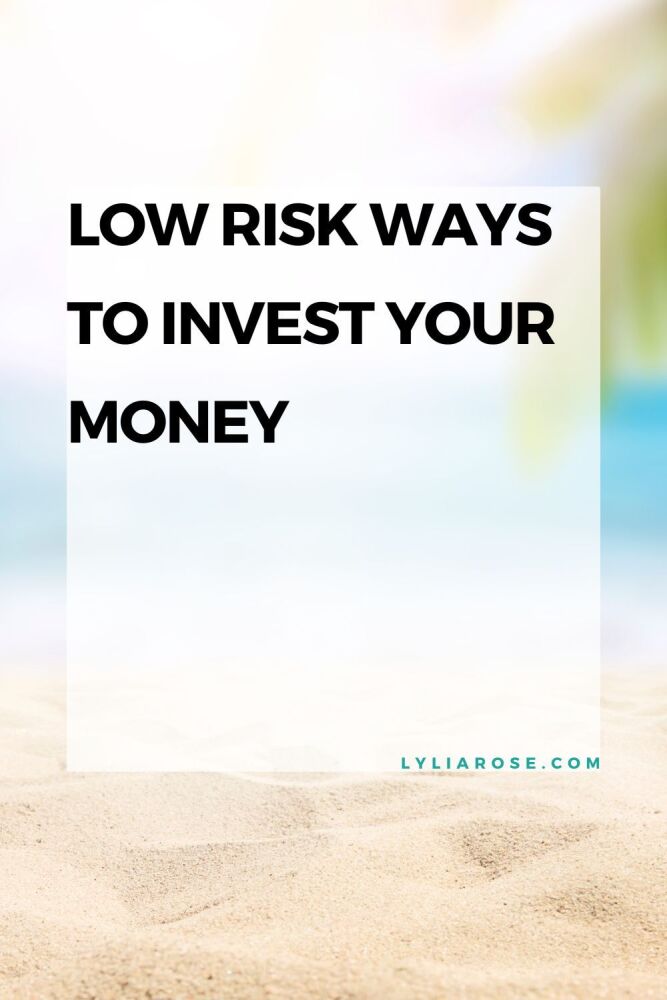Low Risk Ways to Invest Your Money
Posted on
Investing doesn’t have to be a gamble. If you’ve got some savings you’d like to build, why not try some of these low risk investment strategies.

Use a high-interest savings account
Putting your money in a savings account is a practically risk-free way of investing your money. The problem is that many modern savings accounts have very low interest rates, so you won’t make much of a return. You’re best shopping around banks to find the best interest rates going. Online savings accounts can have some of the highest interest rates (some are over 4%) and are usually a good option. Some of these accounts may require you to make regular contributions in order to get the benefit of these interest rates.
Use a certificate of deposit
Another option could be to put your money into a CD (Certificate of Deposit). These are much like savings accounts in that there’s no risk of losing your money, but unlike savings they do have restricted access for a certain amount of time. CDs can have interest rates of over 5% beating some of the best savings accounts. If you’re okay not accessing your savings for a certain period of time, this could be a great way of making a return.
Get free shares
Use my referral links to get a Trading 212 free share and a Wealthyhood free share worth up to £100 and £200 respectively.
Find more offers like these on my how to get free money offers page.
Try peer-to-peer lending
Peer-to-peer lending involves lending your money to another person online. This person then pays back the money in instalments with interest attached. By going through a secure peer-to-peer lending platform you can ensure that you get your loaned money back. There are many different platforms out there, all offering different interest rates. In some cases, interest rates can be over 7% making this a very lucrative risk-adverse way of making a return.
Use an automated trading system
Investing in stocks is generally regarded as a high risk form of investment, but it doesn’t always have to be. An automated trading system can lower the risk of investing in stocks significantly by allowing you to make trading decisions based on hard data. Loss is still an option, but if you diversify your investments and are careful about how much you invest, these losses should be fairly low.
Use credit card rewards
Credit cards needn’t just be a form of debt – they can also be a way of making money if you’re savvy enough to take advantage of credit card rewards. Such rewards are usually only offered if you pay back your credit card bills consistently on time so you need to be sure you have the discipline to spend responsibly (as a result, the risk is on you). It’s worth shopping around to find credit cards that offer the best rewards such as points and cashback. There are also apps and payment platforms that can offer rewards on top of this for using a credit card.
Unconventional Ways to Grow Your Money
Looking for things that aren't traditional investments? Here are some options to consider:
- Start a Side Business: If you have a skill or passion, consider turning it into a side business. This can include freelancing, consulting, or selling handmade goods online. It's a way to potentially earn extra income and build a business over time.
- Collectibles: Investing in collectibles such as rare coins, stamps, vintage toys, or even art can be unconventional but potentially profitable if you have a keen eye for valuable items.
- Cryptocurrency: While considered high-risk by some, cryptocurrencies like Bitcoin have gained popularity as an alternative investment. Keep in mind that the crypto market is highly volatile.
- Buy and Rent Out Assets: You can purchase items like high-quality cameras, equipment, or even parking spaces and rent them out when you're not using them. This can generate passive income.
- Selling Digital Products: If you have digital skills, you can create and sell digital products like e-books, templates, or online courses.
- Micro-Investing Apps: These apps allow you to invest small amounts of money in stocks or ETFs. It's a way to start investing with minimal capital.
- Peer-to-Peer Energy Trading: In some areas, you can participate in peer-to-peer energy trading, where you generate excess renewable energy and sell it to your neighbours.
Remember that unconventional investments often come with their own set of risks and require careful consideration. Always do thorough research and consider seeking advice from financial professionals before pursuing any unconventional investment opportunities.
How to Teach Yourself Strategies to Scale Up Your Investments
When people think about making money and earning a living, they usually think about the different stages of wealth. Some people are fully content with earning a moderate wage working at their job. Others like the idea of scaling up their earnings infinitely, such as running a business. While others like the idea of working as little as possible and earning as much money as they can. There are so many different jobs and ways to live life that it can often be difficult to decide what you should aim for.
Investments are usually one of the better ways for someone to earn money because, as the saying goes, it takes money to make money. Earning a 1% return on £1,000 isn’t much at just £10, but scale that up to £10,000 and you’re suddenly making 10x more. The more you invest, the more you earn–that’s how things work.
But how exactly do you scale up investments? How does one go from investing just £100 to over £1,000 when they’re making small returns? It’s surprisingly common to hit a wall like this, so let’s dive into a few ways that you can teach yourself how to scale up your investments.
It’s all about knowledge and education
One of the things you quickly have to learn is that scaling up your investments requires more knowledge. You need to know about your markets, adjacent markets, and international markets. The more you understand, the higher the chance of you succeeding.
If you aren’t already, then study up on how to invest starting with the basics. No matter how much you think you know, there’s always something new that you can learn from other people. The more time you spend studying, the better off you’ll be.
Diversifying your portfolio of investments
You need to have some variety in your investments–that’s the only way you’re going to discover new opportunities. If you stick with the same investments year after year, then it’s only going to get stale and you’ll miss out on potentially dozens or even hundreds of opportunities in other industries!
Take property investment as an example. Sure, people can specialise in certain types of properties be it apartments, luxury homes, or even commercial places. But if you only stick with a single type of investment, things are going to get a lot harder for you. Not only does diversifying your portfolio open you up to new opportunities, but it’s a great way to learn more about the world of investments and how you can apply your skills to various different kinds of investments.
Moving on from existing strategies
Lastly, you need to know when to exit certain investments. Sometimes, investments don’t really go the way you planned and you’ll want to pull out with the money you’ve earned, then place it into something more lucrative.
Some investments cap out at a certain level and they can’t grow anymore–that’s just how things work. But if you learn how to identify these caps and realise when a business has peaked, you’ll be more inclined to move on to greener pastures.
Conclusion
Investing wisely is a path to financial growth, and low-risk investment strategies can help you achieve your goals without undue stress. By considering options like high-interest savings accounts, CDs, peer-to-peer lending, automated trading systems, and credit card rewards, you can build a secure financial future.
Additionally, unconventional investments may offer unique opportunities, but they require careful research and consideration. Scaling up your investments requires ongoing education and a diversified approach to exploring new opportunities.



